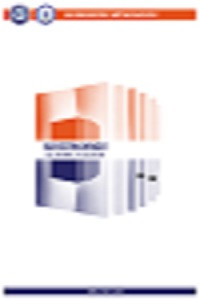Research Article
Aim & Scope
Ege Journal of Education aims to promote experts’ interaction and knowledge sharing among themselves and with society by publishing theoretical and practical studies in compliance with academic and universal scientific criteria.
Ege Journal of Education publishes academic and authentic studies about educational sciences and field studies classified as scientific at national and international level. Highest priority is given to research articles. Each issue includes a maximum of two review articles. Ege Journal of Education, only once a year, may publish an additional issue for the papers presented at conferences.
Articles in Turkish and in English are published in the journal. An extended abstract in English is required for articles written in Turkish and Turkish for articles written in English.
The journal publishes articles in the following subject areas:
Computer Education and Instructional TechnologiesCurriculum Studies in Education
Early Childhood Education
Educational Administration
Fine Arts Education
Guidance and Counseling
Language Education
Mathematics Education
Measurement and Evaluation in Education
Primary Education
Science Education
Social Sciences Education
Special Education
Teacher Education
Author Guidelines
Author Guidelines
The Ege Journal of Education accepts manuscripts that are prepared in accordance with the Author Guidelines. Authors are advised to use the Manuscript Template for proper formatting. In cases not specified in the Author Guidelines, the publication guide of the American Psychological Association (APA) (6th Edition, 2010) should be taken into consideration. Studies that do not comply with the Author Guidelines will not be taken into consideration.
Ethical Principles and Publication Policy
The publication ethics of Ege Journal of Education is based on the Code of Conduct and Best Practice Guidelines for Journal Editors and COPE Best Practice Guidelines for Journal Editors published by the Committee on Publication Ethics - COPE. Thus, all the parties are expected to adhere to the following responsibilities:
Ethical Responsibilities of the Authors
- Authors are expected to ensure that their manuscript is original. In this context, the manuscripts submitted to the journal should not have been published in any other journal before or sent to a journal to be published, should not exceed the similarity rate, which is determined by the journal, and should include citations of the sources used.
- Those who have made intellectual contributions to the article should be listed as authors. After the submission of a manuscript, no changes can be made to the authorship or to the order of authors.
- Authors should declare editors any potential conflicts of interest.
- Authors are expected to share all the relevant documents, information, and data with the Editorial Board.
- Ethics Committee approval and written permission from all institutions and individuals that constitute the sources of research data should be obtained.
- Authors should obtain permission from the right holders to reuse copyrighted materials such as figures, illustrations, tables, etc.
- Authors should pay attention to keep their identity confidential for double-blind review and unbiased evaluation during the publication process.
- Authors are expected to notify the editors or publishers if they detect any error or inaccuracy in the article during the review process or after publication.
Ethical Responsibilities of the Editors
- Editors should act in accordance with the terms of national and international intellectual property rights.
- Editors should publish the steps of evaluation process of a manuscript.
- Editors should ensure a rapid and high-quality evaluation and publication process.
- Editors should establish an open communication based on freedom of thought with the Editorial Board, authors, reviewers, and the readers.
- Editor’s decision to accept or reject a manuscript for publication should be based on manuscript’s consistency with the scientific method.
- Editors should accept all manuscripts which are in the scope of the journal for evaluation process unless they contain a major flaw in methodology.
- Editors should publish guidelines for authors to help them through the evaluation process.
- Editors should keep the names of authors and reviewers confidential during and after the publication process.
- Editors should ensure that reviewers create their evaluation reports using descriptive and constructive language.
- Editors should expand and update the journal’s reviewers pool.
Ethical Responsibilities of Peer-reviewers
- Reviewers should only accept to review the manuscripts in their field of expertise and that they believe they are competent to evaluate.
- Reviewers should take care to evaluate the articles in an impartial and unbiased manner.
- Reviewers should keep their identity confidential for the sake of blind review and being unbiased. They should not try to access authors’ credentials. They should immediately terminate the reviewing process if they realize they know the author(s) and inform the Editorial Board about this.
- Reviewers should pay attention to complete the evaluation process within the given time frame.
- Reviewers should pay attention to use descriptive and constructive language in the evaluation report.
- Reviewers can only use the information in the manuscript once it is published by giving reference.
Ethical Responsibilities of the Publisher
- The publisher ensures the editorial decisions and publishing process to be carried out independently.
- The publisher provides electronic, open, and free access to the journal on the journal’s website.
- The publisher protects the intellectual property rights of all articles published in Ege Journal of Education and keeps a record of unpublished manuscripts.
Plagiarism Detection
It is expected that the manuscripts submitted to Ege Journal of Education are not plagiarized or self-plagiarized. To detect similarity, the authors are asked to obtain a similarity report during the submission and editorial decision-making process. The similarity score should be 15% or below.
If any practices contrary to ethical principles are detected in manuscripts to be published and articles which are published in Ege Journal of Education, we kindly request you to inform us at ege.egitim.dergisi@gmail.com.
Price Policy
Ege University Faculty of Education, the publisher of Ege Journal of Education, has adopted the principle of publishing in the public interest and without any profit. Therefore, no fee is charged from the authors for the evaluation or publication of their manuscripts. For readers, open, electronic, and free access to the journal is provided on the journal's website. Authors are not paid royalties.
Indexes
Journal Boards
Editor-in-Chief

Elif Iliman Püsküllüoğlu completed her bachelor's degree at Dokuz Eylul University. She received her master's and PhD degrees from Mugla Sitki Kocman University from the Educational Sciences Department, Educational Administration Division. Her research interests include organizational behavior (dissent, deviance, justice, democracy), higher education administration, educational supervision, economics of educations, administration of special education, lifelong learning, and adult education. On these topics, Dr. Iliman Püsküllüoğlu has published many articles and book chapters either with her colleagues or on her own. She has presented many proceedings on national and international conferences of education. She has completed many projects in educational sciences. She is currently a member of the research team for an Erasmus Project funded by the European Union. Dr. Iliman Püsküllüoğlu taught several courses, including Introduction to Education, Lifelong Learning and Adult Education, Sustainable Development, and Education.
At the beginning of her career, she was employed by the Ministry of National Education as a teacher of English. Then, she worked as a research assistant at Mugla Sitki Kocman University. She served in the Disabled Student Unit at Mugla Sitki Kocman University. Currently, Dr. Iliman Püsküllüoğlu holds the position of assistant professor in the Faculty of Education at Ege University at the Educational Sciences Department, Lifelong Learning and Adult Education Division.
During the 2024-2025 academic year, she served as a visiting scholar at Arizona State University's Mary Lou Fulton Teachers College. Her postdoctoral research was funded by the Scientific and Technological Research Council of Türkiye. During her visit to ASU, Dr. Iliman Püsküllüoğlu collaborated and did research with scholars outstanding in their disciplines. Her role as a visiting scholar there enhanced her professional development and research.
Editors







 Web
Web
İbrahim Çolak has Phd on Educational administration. His research interests are critical pedagogy, teacher autonomy, organizational behaviors, and a critical look at education system.







 Web
Web
Editor of the Ege Journal of Education
Associate Editor of the Journal of Educational Sciences and Sociology (Inactive)
Assistant Editors

Section Editors


Akdeniz Üniversitesi Eğitim Fakültesi Öğretim Üyesi.




My research brings critical and comparative perspectives to the study and practice of internationalization, women studies, migration, sustainability in HE and LLP.




Layout Editors
This page is licensed under Creative Commons Attribution-NonCommercial-NoDerivatives 4.0 terms.



